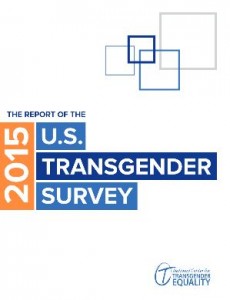 SAN FRANCISCO — Today, the National Center for Transgender Equality released the findings of the U.S. Transgender Survey, the largest survey of transgender people in the United States. Conducted in 2015, the anonymous, online survey examines the experiences of 27,715 adults from all 50 states and the District of Columbia, as well as three U.S. territories and U.S. military bases overseas.
SAN FRANCISCO — Today, the National Center for Transgender Equality released the findings of the U.S. Transgender Survey, the largest survey of transgender people in the United States. Conducted in 2015, the anonymous, online survey examines the experiences of 27,715 adults from all 50 states and the District of Columbia, as well as three U.S. territories and U.S. military bases overseas.
Among the findings is that 18%—nearly one in five—of transgender people who had contact with a medical professional about their gender identity reported that the professional tried to stop them from being transgender. Transgender people who had these negative experiences were also more likely to experience psychological distress, to have attempted suicide, run away from home, been homeless, and have engaged in sex work than those who did not have the experience. The survey also found that 14% of transgender individuals—more than one in 10—who disclosed their transgender identity to their family were sent to a professional to stop them from being transgender.
“This groundbreaking report underscores the vulnerability of transgender youth seeking professional support and the need for policies and legislation aimed at protecting these youth from unethical and potentially damaging treatment by mental health professionals. It also highlights the critical role of family support in ensuring the safety and wellbeing of transgender youth,” said National Center for Lesbian Rights (NCLR) Youth Policy Counsel and #BornPerfect Campaign Coordinator Carolyn Reyes. “No young person should ever be shamed by a professional into thinking that who they are is wrong. Mental health professionals, in particular, should provide care that is ethical and affirming for transgender youth and that assists families in supporting their transgender children.”
The National LGBTQ Task Force’s Trans/Gender Non-Conforming Justice Project Director Victoria Rodriguez-Roldan joined transgender advocates at a press conference at the National Press Club as key report findings were announced.
“The report findings are devastating and unfortunately not surprising. As a transgender Latina, the findings that 43 percent of transgender Latinos and Latinas living in poverty, and 41 percent of transgender Latinos and Latinas reporting unemployment, hit very close to home. And as a transgender advocate working every day on health policy, I know all too well the barriers transgender people experience when attempting to access basic health and human services,” said Rodriguez-Roldan.
“Everyone — including transgender people — deserves a fighting chance to provide for themselves and their families. Unfortunately, transgender people continue experiencing alarming inequalities in the U.S., as this report vividly depicts. Much more needs to be done to protect transgender people against violence and discrimination. Urgent steps include strong federal laws against discrimination in employment, housing, health, education, and public places”
The full report is available online. Some of the key report findings include:
Violence & Mistreatment
- At home, 10% of transgender people who were out to their immediate family report that a family member was violent towards them because they are transgender, and 8% were kicked out of their home.
- At school, 54% of transgender people report being verbally harassed, 24% report being physically attacked, and 13% sexually assaulted.
- In places of public accommodation, 31% of transgender people experienced at least one type of mistreatment in the past year, such as being denied equal treatment or service, verbally harassed, or physically attacked.
Economic Hardship
- One in three transgender people (29%) report living in poverty, compared to 14% of the U.S. population.
- 15% of transgender people report being unemployed, which is 3 times higher than the national average (5%).
Physical & Mental Health
- 40% of transgender people report attempting suicide in their lifetime—nearly 9 times the attempted suicide rate among the entire U.S. population (4.6%).
- 33% of transgender people who saw a health care provider had at least one negative experience related to being transgender, such as verbal harassment or refusal of treatment.
- 33% report not going to a health care provider when they needed because they could not afford it.











